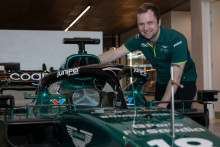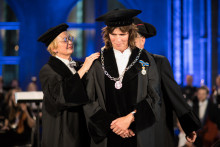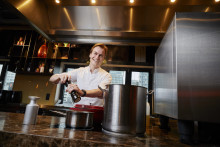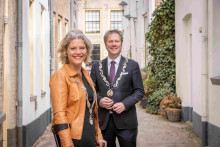Jealemy Galindo (36) is not just another UT alumna. She wants to leave her mark on the world. Growing up in Venezuela, she dreamed of becoming a scientist and leading a research group focused on battling cancer. She followed this goal for quite a while, travelling all the way to the ‘farmers’ land of Twente’, as she calls it, where she studied chemical technology.
As a student at the University of Twente, she won the Unilever Research Prize for her Master thesis and the MESA+ Poster Prize. Continuing what appeared to be a promising academic career, in 2012 she successfully obtained a PhD degree in bionanotechnology at the UT and got a postdoctoral position at the University of Padua in Italy. But this is when things began to unfold. ‘Reality hit and it became clear that academia wasn’t the path for me,’ says Jealemy Galindo. ‘I knew I wouldn’t get where I wanted, I wouldn’t become a leader. However, I realized that I had other skills and that there were other paths I could follow. So I quit science.’
‘I knew I wouldn’t get where I wanted, I wouldn’t become a leader. ... So I quit science.'
‘There is life outside of academia’
‘People said I was crazy, but I knew it was the right decision. The day I decided to quit science was the most important day in my life,’ the alumna continues her story, while we sip tea in a café overlooking Lake Zurich, located just next to Galindo’s office. ‘In science, competition is very tough and positions are very few. Everything needs to align for you, otherwise you don’t succeed. And if everything doesn’t come together for you, you should leave. It’s not about being defeated, but about realizing there is life and career outside of academia. This realization doesn’t come overnight, of course. It was a very rational decision, but it took me a long time, because I really loved science and I dedicated all my time to it.’
In her own words, Jealemy Galindo had high ambitions and didn’t want to wake up at the age of forty and find out that life had passed her by. So she left research behind and, together with her husband, she took off to Silicon Valley. ‘My husband and I actually quit academia at the same time, so it wasn’t very handy, but we knew we would find a way. We went to San Francisco, where we met a lot of crazy people doing great things and tried to understand what we could do with our future. After six months in California we both knew we wanted to make a transition into business.’
Searching for the dream job
‘As a PhD from Twente I had a good scientific background, but knew nothing about business or making money,’ explains Galindo, who therefore decided to sign up for an MBA program at the prestigious IE Business School in Madrid. ‘During one course, we had guided meditations and our task was to imagine where we would be in ten years. When I did that, I could hear people clapping and saw myself as a successful professional at the stock market, ringing the bell during the IPO of the company where I was a CEO.’
Galindo’s career path hasn’t led her to the stock market, though. At least for now, she is dedicated to start-ups. ‘I want to create something from scratch, make it work and then move on,’ she says. ‘There are several stages of start-ups: chaos, organizing the chaos, fast growth and corporation. I don’t know if I have the skills to run a corporation, but I’m fascinated by bringing structure into chaos.’

Bringing structure and building up a new company is exactly what she is doing now, as one of the core members of CyanoGuard, a start-up based in Zurich, where Galindo moved for the job after living in Italy for a while. ‘I don't mind moving from country to country, because the world is a global place and you need to know people everywhere,’ says Galindo. ‘Plus, working in CyanoGuard could be described as my dream job - it combines chemistry and marketing, both my fields of expertise. Because even though I fulfill the role of the Marketing & PR Manager, I’m still in touch with researchers and can visit our lab anytime.’
A lab in your pocket
CyanoGuard is a chemical technology company that makes kits which allow for naked-eye detection of cyanide in water, food extracts or blood samples. These detection kits are very small and easy to use, enabling virtually anyone to test for cyanide in any liquid. ‘We bring a lab into your pocket,’ smiles Jealemy Galindo. ‘Thanks to our technology, anyone can monitor toxic substances in a very rapid, simple and safe way. Our product doesn’t contain any dangerous chemicals and doesn’t require any special equipment.’
You indeed don’t need any special training or equipment to use the CyanoKit. Just open the small box, take out a vial, put in a (water) sample and pour the liquid through the sensor. The sensor will instantly change color, based on the amount of cyanide contained in the sample. ‘Right now it’s like a simple pregnancy test, but we are working on adding an exact number indicating the cyanide level,’ clarifies Galindo, showing me the contents of the test kits made in CyanoGuard’s own lab.

Horizon 2020
CyanoGuard recently entered the exclusive list of innovative SMEs selected for funding within Horizon 2020. The start-up already supplies to customers within Switzerland and is working on pilot projects in South America, Asia, Africa and Australia. ‘In principle, our sensors can be used for testing any liquid, including blood, but we are still in a development phase. We need to continue research and do tests on patients, so we can also supply to the medical sector,’ says Galindo, explaining that CyanoGuard currently sells its kits mainly to companies in the mining, electroplating and chemical industry.
‘Most people know that cyanide is toxic, but might not know that it is also a very important chemical. It’s used while producing plastics, during metal extraction, it is contained in food, such as cassava or apricot kernels. If you think about it, virtually every piece of furniture in IKEA contains plastic and can therefore become cyanide if it catches fire,’ describes Galindo. ‘That is why it’s important to have technology that detects cyanide in a fast and safe manner, which is what CyanoGuard provides. We offer an alternative to other companies that mainly use old-fashioned techniques which haven’t changed in fifty years and require you to hire an expert with specialized equipment. With our technology, everyone can contribute to less pollution and poisoning cases.’

‘Something is missing in Twente’
Overall, Jealemy Galindo seems very passionate about her job and happy with her life choices. ‘I definitely don’t miss academia. Everything moves slowly within academia. You never get to see the product of your research hit the market,’ she says. ‘I also really enjoy living in Switzerland. You don’t have to be ashamed of dreaming big here. Almost every discovery at a university turns into a start-up, because there is a great ecosystem for start-ups. In Zurich, you can be ambitious and still have a good work-life balance. I feel that in Twente you have to be mentally very strong to make it. A start-up in Twente can consume you, because getting money without sacrificing a lot is a problem there. Even though the UT claims to be an entrepreneurial university, I never had a business course during my entire study there, and so I had no idea how to turn ideas into a business. I wish that would change, because it is a great university and it could compete at a very high level, but something is missing. The proper ecosystem isn’t there.’
'I feel that in Twente you have to be mentally very strong to make it.'
According to Jealemy Galindo, this is also one of the reasons why many UT researchers ‘get stuck in academia’. ‘They don’t see any other options but science, because PhD in biology or chemistry at the UT is great, it teaches you a lot, but most of your skills are only useful in a lab,’ thinks the alumna. ‘So you need a plan B. You need to work on your other skills too and see that there is another side to the coin. Change is really good, you only need to be open to other paths. I was 32 when I switched and I want to show other scientists that there are other opportunities for them besides academia. You just need the balls to switch.’







